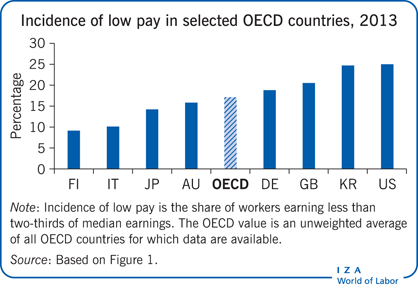Elevator pitch
Low-wage employment has become an important feature of the labor market and a controversial topic for debate in many countries. How to interpret the prominence of low-paid jobs and whether they are beneficial to workers or society is currently an open question. The answer depends on whether low-paid jobs are largely transitory and serve as stepping stones to higher-paid employment, whether they become persistent, or whether they result in repeated unemployment. The empirical evidence is mixed, pointing to both stepping-stone effects and “scarring” effects (i.e. long-lasting detrimental effects) of low-paid work.

Key findings
Pros
Having a low-paid job may be better than having no job at all.
Accepting low-paid jobs prevents scarring effects of unemployment that could create long-term problems for the worker.
Low-paid employment may serve as a stepping stone into higher-paid employment, for instance, by improving an individual’s employment-related skills.
For less qualified or long-term unemployed persons, low-paid jobs may offer a suitable way to re-integrate them into the labor market.
Cons
Individuals can be trapped in low-paid jobs.
Accumulation of human capital while working in low-quality jobs is often limited.
Employers may interpret low-paid jobs in an individual’s employment history to be an indicator of low productivity.
Accepting low-paid employment may be a negative signal, particularly for qualified workers, though it may be less of a problem for other unemployed persons.
Low-paid employment can drive individuals into repeated spells of unemployment, which may result in a low-pay no-pay cycle.